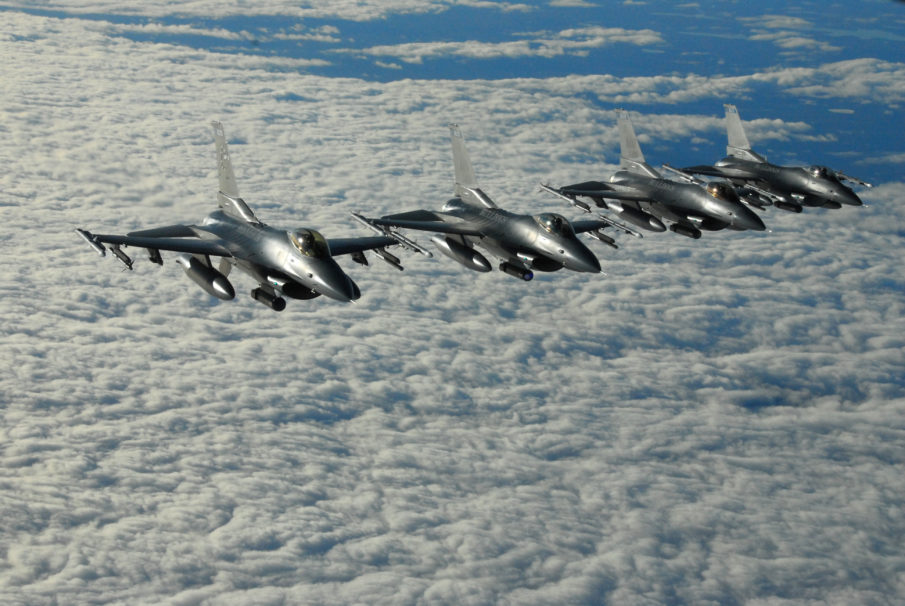Senior aviation officials from all four branches testified before Congress on Thursday to emphasize the need for budget certainty in the future in order to maintain America’s combat readiness in the skies.
Over the past ten years of combat operations, the Department of Defense has been forced to continue operations under what’s called “continuing resolution” for over a thousand days and counting. This occurs when the federal government fails to pass a defense budget before the fiscal year it funds. This year, the United States has once again crossed into new fiscal years without funding the defense infrastructure, halting forward progress and hindering overall readiness.
Army Maj. Gen. William K. Gayler, commanding general of the U.S. Army Aviation Center of Excellence and of Fort Rucker, Alabama; Lt. Gen. Mark C. Nowland, Air Force deputy chief of staff for operations; Lt. Gen. Steven R. Rudder, Marine Corps deputy commandant for aviation; and Navy Vice Adm. Mike Shoemaker, commander of Naval Air Forces all appeared before the House Committee on Armed Service’s readiness subcommittee to make a plea for an increased, but more importantly, consistent level of funding in order to prevent America’s military readiness issues from compounding into a significant threat to our nation’s defense.
“Every hour of every day, airmen support homeland defense, deter aggression from abroad and provide a robust and reliable nuclear deterrent,” Nowland told lawmakers, “However, the Air Force is quickly approaching an inflection point.”
According to the Air Force General, 26 years of continued operations have taken a toll on the branch, and America’s potential peer-level enemies have continued to close the technology gap separating the United States from its competitors. He acknowledged that President Trump’s budget proposal lays the foundation to “restore readiness and increase joint lethality.”
“But most importantly an approved budget with stable, predictable funding levels will build the bridge to the future,” he said. “Continuing resolutions and a return to the Budget Control Act measures reverse all the progress we’ve made to this point.”
Army Maj. Gen. William K. Gayler echoed Nowland’s sentiments, adding “force structure reductions, increased global requirements, funding uncertainty and the requirement to train our forces to a higher level of preparedness raise concerns about the overall future readiness of Army Aviation.”
Admiral Shoemaker then elaborated on the challenges faced by Navy aviation, emphasizing that predictable funding is “absolutely required” to improve readiness. “Then we must buy back the readiness we’ve lost from years of resource-constrained budgets,” he added.
“We are meeting the combatant commanders’ requirement for ready, lethal carriers and air wings forward, but at a tremendous cost to the readiness of our forces at home,” he continued.
According to Shoemaker, the Navy was forced to reallocate fighters to equip the USS Carl Vinson, USS Nimitz and USS Theodore Roosevelt prior to their 2017 deployments, but doing so left non-deployed squadrons without the adequate number of assets to conduct the training needed to keep non-deployed aviators proficient for their own rotations overseas. The admiral even went so far as to call what they’d been forced to do “a shell game.”
General Rudder from the Marine Corps used the phrase “improving, but fragile” when describing the Marine Corps’ aviation readiness. The Marines have suffered a number of aircraft failures throughout the last year, including a C-130 that crashed, killing 15 Marines in the U.S., and one of a number of Osprey incidents which cost the lives of three Marines special operators.
Already have an account? Sign In
Two ways to continue to read this article.
Subscribe
$1.99
every 4 weeks
- Unlimited access to all articles
- Support independent journalism
- Ad-free reading experience
Subscribe Now
Recurring Monthly. Cancel Anytime.










COMMENTS